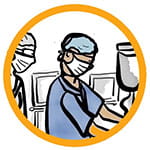Physician Assistant (Anaesthesia)
 Physician Assistants (Anaesthesia) are highly trained and skilled practitioners that work within an anaesthetic team under the direction and supervision of a Consultant Anaesthetist. PA(A)s are fully trained professionals that have completed a Physicians’ Assistant (Anaesthesia) Postgraduate Diploma.
Physician Assistants (Anaesthesia) are highly trained and skilled practitioners that work within an anaesthetic team under the direction and supervision of a Consultant Anaesthetist. PA(A)s are fully trained professionals that have completed a Physicians’ Assistant (Anaesthesia) Postgraduate Diploma.
Area of practice
Perioperative and non-perioperative.
Overview of tasks and activities
Clinical duties
- Implementing the anaesthesia care plan including the induction, maintenance and emergence from anaesthesia under appropriate supervision
- Initiating and managing fluid and blood therapy within the plan of care
- Positioning or supervising the positioning of patients to assure optimal physiologic function and patient safety
- Monitoring and maintaining a safe, clean, and therapeutic environment for patients, staff and visitors
Administrative duties
- Interpreting and utilising data obtained from invasive and non-invasive monitoring equipment
- Record keeping
- Participating in audit, complaints, compliments and clinical / non-clinical incidents with a view to improving patient care as part of the wider anaesthetic team
- Risk management and health and safety recommendations
Liaison between patients and doctors
- Liaising with the operating theatre team to ensure equipment and drugs are available and checked
- Planning and implementing post-operative care in conjunction with staff from the post anaesthetic care unit
- PA(A)s are flexibly managed by Departments of anaesthesia with varying different models including 2:1 ratio (two PA(A)s to one consultant)
- Deputising for anaesthetists in a variety of situations where their airway and venous cannulation skills are required and will assist in patient care as determined by their supervising consultant
- Preoperative interviewing and physiological and psychological assessment of patients
- Collecting patient information from patients, taking a history, physical examination
- Observing laboratory, radiographic and other diagnostic data to identify relevant problems
Supervision and management
Physicians’ Assistant (Anaesthesia) work within an anaesthetic team under the direction and supervision of a Consultant Anaesthetist. When delegating responsibility to PA(A)s the medically qualified anaesthetist remains responsible and accountable for the PA(A)s actions.
Autonomy
- On qualification the PA(A) may undertake the induction of and emergence from general anaesthesia under the direct supervision of a consultant or senior anaesthetist, and will make clinical decisions themselves under indirect supervision while established anaesthesia is maintained
- Partial autonomy is based on their position as a member of a clinical anaesthetic team that is at all times led by a medically qualified consultant anaesthetist
- Supervision must not exceed 2:1 in accordance with national guidelines
Eligibility for training
The programme is open to applicants from two different routes:
Registered health care practitioners (eg, nurses, operating department practitioners) require one or both of the following;
- At least three years’ full-time, post-qualification work experience in a relevant area.
- A first degree in a health-related subject
OR
New entrants to health care (graduates or graduate equivalent) require;
- A biomedical science or biological science background
- Preferably a second-class Honours degree or better, or other evidence of recent and successful academic activity
- A demonstrable commitment to a career in health care
Training
- The PA(A) postgraduate diploma is a 27-month full time course combining academic study and clinical training
- The course comprises 12 modules which introduce trainees to the clinical practice of anaesthesia, applied physics, the anaesthetic machine and monitoring principles
- In later modules trainees study anatomy and physiology related to anaesthesia and surgery. The final assessments are based on the management of life-threatening emergencies and advanced practice
- Nationally recognised examinations take place at eight and 24 months. Successful graduation requires passing these. Examinations consists of MCQ exams, Clinical skills Workbook completion, Record of In Training Experience Diary, Tutor Assessments and at 24 months the Objective Structured Clinical Examination (OSCE) that takes place at the Royal College of Anaesthetists
- Finally, practitioners are awarded the new status of Physicians’ Assistant (Anaesthesia), and are invited to become an Affiliate of the Royal College of Anaesthetists
Professional accountability
There is no statutory regulation for Physician Assistants (Anaesthesia), but PA(A)s are encouraged to join a voluntary register held by the Association of Physicians’ Assistant (Anaesthesia) – now at the RCOA.
Banding
Band 7.
